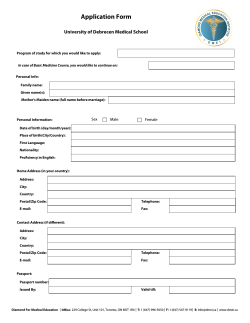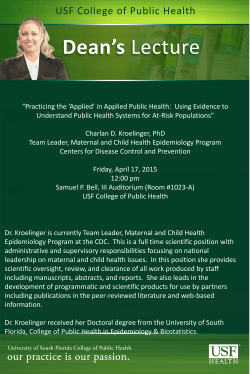
MASTERS OF SCIENCE CROP PROTECTION (PATHOLOGY
MASTERS OF SCIENCE CROP PROTECTION (PATHOLOGY OPTION) KCU 800: Biometry Importance of biostatistics; hypotheses; comparison of populations and samples; variables, graphs and frequency distribution, measures of central tendency, and dispersion, commonly used distributions, statistical estimation and decision theory; computer applications and analysis of experimental data; completely randomized designs, lattice designs, latin square designs and split plot experiments; factorial experiments; variation in factor and level number. Correlation and regression theory; distribution: chi-square and binomial; non-parametric tests; tests of significance. KCU 801: Research Methods and Scientific Writing Overview; types of research; social and scientific, observation, experimental and survey. Main steps of research projects; identification of research problems, formulation of research questions, hypotheses, and objectives, planning, literature review. Sampling strategies; sampling designs; methods of data collection. Data cleaning and management; analysis; interpretation; report writing. Writing technical reports, styles of writing and referencing. Dissemination: publication, seminars, information packaging. Research ethics. IPR. KST 806: Insect Pests and Management General classification of insects: beneficial insects and insects that attack agricultural crops: morphology; biology and natural history of beneficial insects and harmful insects: reproductive, physiology and behaviour of insects: insect communities and population dynamics: the role of insects in disease transmission: ecology and migration of insects: insect management systems; biological, chemical, cultural, genetic; crop loss assessment. KST 812: Plant Protection Products and Environment Categories and classification of pesticides; bio-pesticides; pesticide formulation; mode of action; classification by activity; systemic and contact pesticides; pesticide efficacy; application methods: droplet size; safe and effective use of pesticides; cross and multiple resistance; environmental effects and related issues; re-entry period; pesticide labels; legislation; legal use of pesticides; maximum residue limits; phyto-toxicity; crop selectivity; resistant plants; public health toxicity KST 838: Plant Resistance to Biotic and Abiotic Stresses General principles and methods of breeding for resistance; choice of parental material; sources of resistance; inheritance of resistance; assessment and selection for resistance; development of resistant varieties; genetic variability of crop pests and pathogens; types of resistance; morphological and biochemical expression of resistance; environmental and genetic factors influencing expression and stability of plant resistance; mechanisms of plant resistance to pests and pathogens; mechanisms and breeding for tolerance to drought and, mineral deficiency and toxicity. KST 841: Plant Bacteriology Prokaryotic cell cytology; diversity and taxonomy of bacterial plant pathogens; structure, reproduction, growth, nutrition, survival, spread and epidemiology of bacterial plant pathogens; impact of climate change on plant bacteriology; diagnostics of bacterial plant pathogens: conventional, biochemical, molecular methods; pathogenicity test; bacterial pathogens of planting material, stored products; vectored bacterial pathogens; protocols in plant bacteriology: isolation, culture, staining, purification and culture preservation; disease management methods unique to bacteria; biotypes in relation to SPS issues. KST 842: Plant Mycology Eukaryotic cell cytology; diversity and taxonomy of fungal plant pathogens; structure, reproduction, growth, nutrition, survival, spread and epidemiology of fungal plant pathogens; impact of climate change on plant fungal pathogens; diagnostics of fungal plant pathogens: conventional versus molecular methods, pathogenicity tests; vegetative compatibility tests; homothallism and heterothallism; protocols in plant mycology: isolation and culture preservation; fungal pathogens of planting materials; stored products and mycotoxins; vectored fungal pathogens; SPS issues; disease management methods unique to fungi; biotypes and resistance to fungicides. KST 843: Plant Virology Composition of plant viruses; nomenclature and classification: viral strains, molecular basis of variation; plant infection by viruses; factors influencing infection and disease; disease symptoms and effects on physiological functions; histological changes and cytological effects; impact of climate change on plant viruses; detection, assay and diagnosis of plant viruses; isolation and purification of plant viruses; transmission: mechanical and biological; Control and management of viral diseases; some important plant viral diseases, seed health and SPS issues. KST 844: Plant Nematology History of plant nematology; taxonomy of plant nematodes; biology, mode of nutrition, reproduction and development; life cycle; survival: r and k strategists; dispersal; infection; etiology; symptomatology; epidemiology of plant parasitic nematodes; histology and cytology of nematode infected tissues; nematode interactions; impact of climate change on plant nematodes; control and management of plant nematodes; other soil nematodes: entomopathogenic and free-living nematodes; major plant diseases of nematodes. KST 856: Plant Disease Epidemiology Epidemiological principles in host pathogen interactions. Novel methods of identifying and monitoring diversity between and within pathogens. Factors influencing disease development; pathogen factors, host factors and environmental factors. Measurement of disease; Disease progress in time and space and forecasting. Epidemiology and disease management; Strategies, tactics for reducing initial inoculum, tactics for reducing the rate of epidemic development. Epidemiology in Agroecosystems; Crop loss assessment, economic impact of disease & thresholds, decision making in disease management. LEVEL 880 KST 880: Research and Thesis- 8 Units Selection of research topic will be done by the student in consultation with supervisors. Research and thesis writing will be done in year two of the study culminating with thesis submission. The thesis will be examined according to the university regulation that is written and oral presentations.
© Copyright 2025












